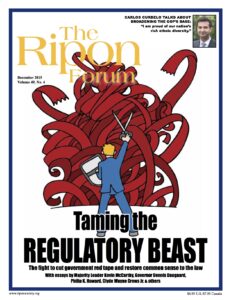Latest Ripon Forum Looks at the Fight to Cut Red Tape and Restore Common Sense to the Law

WASHINGTON, D.C. — With Congress reaching agreement this year on plans to rebuild our roads, reform our schools, and expand foreign markets through global trade, the latest edition of The Ripon Forum looks at another area where common sense and compromise are needed in 2016 — overregulation.
“Fixing the administrative state and reducing the broken regulatory system in America is about much more than economics,” writes House Majority Leader Kevin McCarthy in an essay for the latest edition of the 50-year old Republican journal. “It is about holding government accountable, putting a stop to corruptive influences in Washington, and ending the proliferation of bad rules.”
According to author and good government expert Philip K. Howard, the growth is due not only to a lack of proper oversight, but by good intentions gone astray.
“American government today is run by dead people — past members of Congress who wrote all these statutes, and bureaucrats long gone who wrote the millions of words of regulations,” writes Howard, who has also penned numerous books on the subject, including the landmark 1995 treatise, The Death of Common Sense. “Government is broken not mainly because past lawmakers were stupid, but because legislative programs almost never work out as planned.”
The result, writes Clyde Wayne Crews Jr. of the Competitive Enterprise Institute, is that the regulatory state in America has not only grown bloated, but is spinning out of control.
“If the ‘regulatory state’ were a country,” Crews writes in an essay, “it would be the 10th largest, between Russia and India. There were 224 laws last year, but 3,554 rules and regulations issued by unelected bureaucrats. Regulation from the unelected bureaus seems to be accelerating: of the six highest ever Federal Register page counts, five have occurred under President Barack Obama. And at 74,964 on November 30, the year 2015 may set another record.”
In their essays, McCarthy, Howard and Crews all point to The REINS Act, which was approved by the House in July, as an example of legislation that would take a good first step toward slowing the growth of the regulatory state. But, they all agree, more steps need to be taken to ease the burden of overregulation.
One leader who has taken those steps in his own state is Governor Dennis Daugaard of South Dakota. Writing in the latest Forum, Daugaard recounts how he launched a “red tape review” shortly after taking office that has not only “eliminated over 4,000 sections of law and regulations,” but has also helped make South Dakota one of the top states in America to do business.
The latest edition also features four members of the National Federation of Independent Business writing about how overregulation is affecting their livelihoods, and Ferris State University Professor David J. Hebert examining the positions of some of the top presidential candidates when it comes to regulation.
Other authors and essays featured in the latest Ripon Forum include:
- Former House Appropriations Committee Chairman Robert L. Livingston – writing about congressional dysfunction on Capitol Hill and proposing that a Joint Committee be established to recommend comprehensive organizational reforms;
- S. Rep. Michael Burgess (TX-26) – writing about the problems plaguing the National Highway Traffic Administration and the need for government and automakers to come together to strengthen auto safety;
- Attorney and research fellow Brent Skorup – writing about the debate over regulating the Internet and how the Federal Communications Commission has become President Obama’s “Broadband Bully;” and,
- A Q&A interview with former Financial Services Committee Chairman Mike Oxley – who looks back on the career of his good friend and colleague John Boehner and discusses his accomplishments as Speaker of the House.
In addition, this edition of the Forum also features a profile of U.S. Rep. Carlos Curbelo (FL-26), who discusses his first year in office and broadening the GOP’s base.
The Ripon Forum is published by The Ripon Society, a public policy organization that was founded in 1962 and takes its name from the town where the Republican Party was born in 1854 – Ripon, Wisconsin. One of the main goals of The Ripon Society is to promote the ideas and principles that have made America great and contributed to the GOP’s success. These ideas include keeping our nation secure, keeping taxes low and having a federal government that is smaller, smarter and more accountable to the people.



